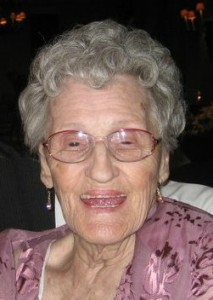 On March 28th, my world changed forever. Four weeks after a car accident that left her in a coma, my Grandmother took her last breath (with the help of a ventilator) and went into the most peaceful sleep anyone could imagine. Or that’s how I think of it, anyway.
On March 28th, my world changed forever. Four weeks after a car accident that left her in a coma, my Grandmother took her last breath (with the help of a ventilator) and went into the most peaceful sleep anyone could imagine. Or that’s how I think of it, anyway.
The events that led up to that moment are unchangeable. A woman drove through a stop sign going 40 mph and slammed into the side of a car that was driven by my Aunt. Her sister was in the passenger seat, while their mother and youngest sister sat in the back seat. They were driving my Grandmother to a doctor’s appointment. After the initial hit, the car driven by my Aunt flipped several times before landing on the roof. The police were called, ambulances came, the jaws of life were used and everyone was brought to the hospital alive.
My Aunts sustained minor injuries (cuts, bruises, burns, etc). My Grandmother, though, had far more serious injuries including broken bones (ribs, arms and leg) and was left unconscious. Her condition ebbed and flowed in the following weeks, but no real progress was ever made. On March 28th, after weeks of intense debate (what else can you expect from a bunch of Italians?) all six of my Grandmother’s children went to the hospital together to say goodbye to their Mom. This was supposed to be the hardest part – and it was … to an extent.
The news hit me like a ton a bricks. I knew it was coming and I had “prepared” myself for the loss – but it didn’t matter. This wasn’t the sort of thing you could be ready for. “What happens when somebody dies, anyway?” That question played on repeat inside my mind. Over and over. She couldn’t really be gone, could she?
I spent my entire childhood attending church, but always thought I was “too smart” for such silly nonsense. The stories were fun to think about, but they were never more than stories to me. So, as a reformed Christian I had been confident in my assertion that death is simply scientific, a process that happens in nature, for various reasons, at various times. When something, or someone, dies they’re dead. It’s simple! Right?
Well, it sounded good. I had never lost anyone before. What did I know?
I didn’t, by any means, go running back to a religion I was sure I did not believe in. But I did take some time to think about death and what it means to me. I still think about it from time to time. That’s the thing about feelings; they’re fluid. They change depending on a situation. For me, the feeling of loss was, and still is, too much to bare. I could no longer accept the notion that when a person is dead, they’re dead. What could I accept? The idea that she left her pain behind to be in a more peaceful state – out of body, out of mind. The idea that a little piece of her is in my heart where it will stay until the end of time. The idea that she could hear me if ever I need her to. … All of those thoughts leave me feeling closer to her, and in turn, more peaceful.
I’m sure these thoughts and ideas will change again at some time or another. I’m sure the next time I lose someone it will feel completely different. I’m not ready to believe in a heaven or hell, but I do believe her spirit is alive and well… somewhere.
For much of my life, I followed the beliefs of other people (intentionally, or otherwise). The loss of my biggest love, though devastating and sometimes seemingly unfair, forced me to look within myself and follow what I believe for the first time in my life. My beliefs are no longer based in any specific religion, nor are they based in a science book. My beliefs are based on what I feel in my heart and getting to that point has been a lesson well worth learning.